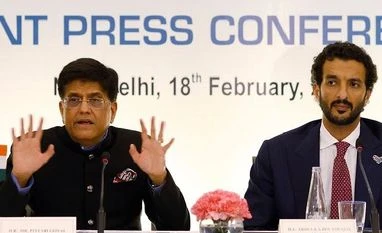The comprehensive free trade agreement between India and the UAE is likely to benefit about USD 26 billion worth of domestic products like gems and jewellery that are currently subjected to 5 per cent import duty by the Gulf nation, an official said.
Labour intensive industries such as textiles, leather, footwear, sports goods, plastics, furniture, agricultural and wood products, engineering, pharmaceuticals and medical devices, and automobiles would gain substantially from the pact.
The services sector segments which would get significant boost from the pact include computer-related services, audio-visual, education, health, tourism, travel, nursing, engineering, and accountancy, the official said.
India and the UAE on February 18 signed the comprehensive economic partnership agreement (CEPA) with a view to boosting bilateral trade in goods to USD 100 billion over a five-year period and creation of lakhs of jobs.
"While the UAE is already India's second largest export destination with exports valued at approximately USD 29 billion in 2019-20, CEPA with UAE is likely to benefit about USD 26 billion worth of Indian products that are subjected to 5 per cent import duty by the UAE," the official said.
As per estimates, exports of plain gold and gold-studded jewellery would increase to USD 10 billion in 2023 and tariff concessions offered to the UAE by India in products like gold will reduce the import cost of inputs. Additional increase in textiles exports is projected at USD 2 billion over the next five years.
"With duty free tariffs, India can cater to the hospital segment of the UAE through institutional selling of home textiles like bed and bath linen as well as contract textiles - beach towels, salon and spa linen etc," the official said.
Also Read
Under the agreement, the UAE is offering overall duty elimination on over 97 per cent of its tariff lines (or products) corresponding to 99 per cent of India's exports in value terms.
"A breakthrough feature of this agreement is a permanent safeguard mechanism which has been agreed upon and can be resorted to in a situation of sudden surge in imports. This is the first time India is entering into a contract enforcing Country of Origin which will disable the circumventing of products from other countries through the FTA route," the official added.
Besides, there is a separate exclusion list for some products to protect the domestic industry. Goods in that list would remain out of the ambit of the pact. Tariffs Rate Quotas (TRQs) offered by India to the UAE on certain items of its export interest will be only reviewed after 10 years.
(Only the headline and picture of this report may have been reworked by the Business Standard staff; the rest of the content is auto-generated from a syndicated feed.)
)